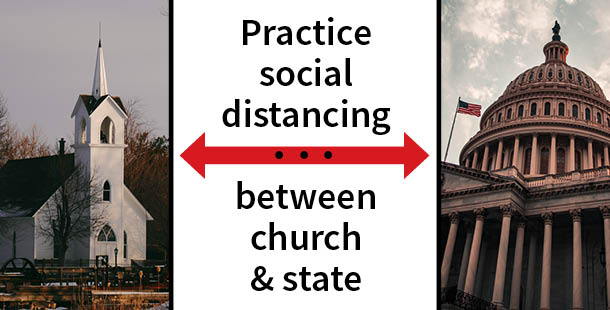
The high court’s series of rulings in favor of science-denying religious litigants signals serious trouble ahead for the principle of separation between state and church, warns the Freedom From Religion Foundation.
Near midnight on Friday, the U.S. Supreme Court issued yet another emergency decision striking down Covid-19 restrictions as applied to religious gatherings by the state of California, in this case affecting those in private homes. As the majority itself noted, “This is the fifth time the court has summarily rejected the 9th Circuit’s analysis of California’s Covid restrictions on religious exercise.” That’s five times too many.
Here’s what the case is about. Rev. Jeremy Wong and Karen Busch, who are holding religious services in their Santa Clara County homes, sued the state of California for restricting any gatherings in private homes to three households. A federal judge ruled against them, noting that the law applies equally to all private gatherings, not singling out those for religious purposes. When the 9th U.S. Circuit Court of Appeals refused to block the ruling, the plaintiffs asked the Supreme Court to intervene — and the damage was done.
The unsigned Supreme Court majority in its ruling renewed its theme of alleged ill-treatment of religion, charging: “California treats some comparable secular activities more favorably than at-home religious exercise, permitting hair salons, retail stores, personal care services, movie theaters, private suits at sporting events and concerts and indoor restaurants.”
This, of course, is comparing apples to oranges — or “apples and watermelons,” as dissenting Justice Elena Kagan put it. The majority — Justices Clarence Thomas, Samuel Alito, Brett Kavanaugh, Neil Gorsuch and Amy Coney Barrett — is continuing to indulge in what veteran court observer Linda Greenhouse has labeled “grievance politics.” Joining Kagan’s dissenting opinion are Justices Stephen G. Breyer and Sonia Sotomayer. Although he did not sign Kagan’s opinion, once again Chief Justice John Roberts dissented on this issue.
“California . . . has adopted a blanket restriction on at-home gatherings of all kinds, religious and secular alike,” Kagan noted, ably pointed out the logical fallacy of the majority opinion: “The First Amendment requires that a state treat religious conduct as well as the state treats comparable secular conduct. Sometimes finding the right secular analogue may raise hard questions. But not today.” The state, Kagan adds, need not “treat at-home religious gatherings the same as hardware stores and hair salons.”
FFRF has to ask: Why the drama? Where’s the emergency requiring a late night ruling at the start of the weekend? The restrictions were due to be modified this week, on April 15, to allow as many as 25 persons. Once again, SCOTUS has gone out of its way to undercut secular Covid-19 mitigation policy, in order to privilege religious litigants.
A Reuters news analysis about the increasing number of shadow docket rulings warns: “Decisions can come in the middle of the night, with no public discussion and no guidance to lower-court judges on how to analyze similar cases.”
A legal study released last week troublingly reveals that “the Roberts court has ruled in favor of religious organizations, including mainstream Christian organizations, more frequently than its predecessors” — in fact 81 percent of the time.
The latest ruling is yet another sign of big trouble to come for the Establishment Clause.

